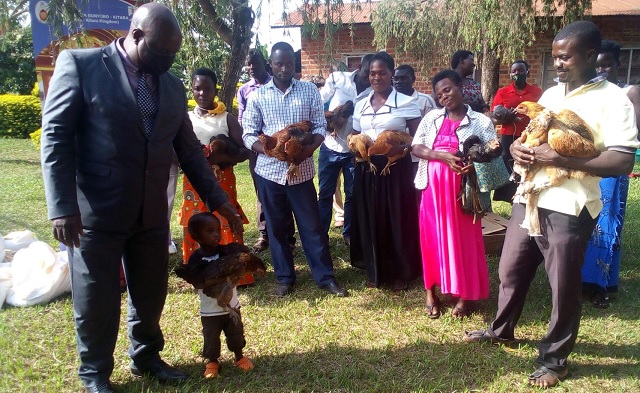
Kagadi, Uganda | THE INDEPENDENT | Bunyoro-Kitara kingdom has come up with a programme meant to improve the quality of life of its subjects through having model homesteads.
The programme, if well implemented, will enable families to have enough food for nutrition, start income-generating activities like chicken rearing, modern farming and environmental protection, among others.
The indefinite initiative has started with training its grassroots structure leaders who would in turn train the subjects.
Andrew Byakutaga, the Kingdom Premier explains that they have 120 sub-county chiefs who are going to be trained before the end of this financial year so that by the onset of the coming rains in March, each person should be able to start their own agricultural enterprises.
“What we want is to replicate the model farm in every sub-county in all the 8 districts in the kingdom so that the subjects of the king will also come and learn and replicate the same to eradicate poverty,” Byakutaga noted.
Bunyoro comprises districts of Hoima, Masindi, Kibaale, Kiryandongo, Buliisa, Kakumiro, Kikuube and Kagadi.
He said the vision of the Omukama Solomon Gafabusa Iguru, is to have a prosperous and great kingdom in 30 years, adding that this is how the dream will be achieved through such initiatives.
Byakutaga said they have identified Good Year Kisembo, a model farmer with a modern mixed farm who is also a member of Rukurato (parliament) for Kyenzige sub-county in Kagadi district to offer practical aspects of the training.
“They will be practical trainings where the trainees are able to see things which are being done here so that they can also go and replicate this model,” he said, at the sidelines of a ceremony to pass out the 15 sub-county chiefs in Kitema village, Kyenzige sub-county in Kagadi district.
According to Byakutaga, they thought it would be easy for the kingdom to have its initiative move hand in hand with operation wealth creation of the government so that a larger population would benefit.
Byakutaga who urged the subjects to engage in the activities they are rolling out to fight household poverty, also advised them to embrace those of the government meant for the same cause saying this will improve household incomes, food security, and nutrition and with oil and gas development, it will help meet the demand for foodstuffs due to the expected influx of people who will come to seek for opportunities in the industry.
Byakutaga explains that studies show that Bunyoro has one of the highest poverty levels in the country which must be addressed to see people live better lives.
According to the January 2018 World Bank report adopted from the 2012/13 Uganda national household survey and the 2014 national housing and population, Bunyoro sub-region has western Uganda’s highest poverty rate at 10.4%.
Wilson Wairindi, the kingdom minister for agriculture says the trainees will be trained to have incomes and desirable homes which have stable marriages, kitchens and clean sanitary facilities.
Gerald Baleke, the Kingdom’s county chief for Buhaguzi in Kikuube is optimistic that the training will give a big boost towards improving household incomes to the kingdom subjects.
Sarah Mary Bigabwenda, the chairperson production committee Bunyoro Kitara kingdom says with the vast knowledge being instilled in the Saza chiefs, the kingdom will be able to boost modern farming that will in turn support the financial status of the subjects and have food security.
In March last year, the kingdom entered a three-year partnership with Uganda National Farmers Federation-UNFF, to use its structures to teach farmers proper agronomical practices and also set up tree nursery beds to plant one million trees on farmlands and the depleted forests across the region.
*****
URN
 The Independent Uganda: You get the Truth we Pay the Price
The Independent Uganda: You get the Truth we Pay the Price





